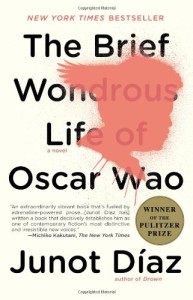Now that I have finished the first draft of The Next Novel, I’m awash with doubts. I don’t think I’ve gotten to the heart of the story.
What about … ?
And shouldn’t she have … ?
Etc. etc. etc.
I shouldn’t actually question this: of course I haven’t gotten to the heart of it!
I’ve read two excellent on-line accounts recently by authors who went through painfully long revision processes. The first is Junot Díaz’s account of writing The Brief Wondrous Life of Oscar Wao. He struggled with this novel for five years, then gave up … gave up writing entirely. Then …
“One night in August, unable to sleep, sickened that I was giving up, but even more frightened by the thought of having to return to the writing, I dug out the manuscript. I figured if I could find one good thing in the pages I would go back to it. Just one good thing. Like flipping a coin, I’d let the pages decide. Spent the whole night reading everything I had written, and guess what? It was still terrible.”
And then five more years of revisions … to overnight success.
The second is a wonderful blog entry by writer Gail Carson Levine on finding the right point-of-view for a story she was writing on Snow White. Three hundred pages from the POV of a dwarf. Scratch. Three hundred more from the POV of the prince. Scratch. Three hundred in omniscient. Scratch. And finally: success, from the POV of Snow White in her coma.
“The point is that POV can be hard to figure out and may not be possible to decide on in advance. You may have to try telling your story one way and another (and another and another) until you find out. There may be no shortcut for a particular book.”
Point taken.



Hi Stephanie, I love Maass! I didn't know he had a new one out. I'll check into it.
This continues our discussion on the yahoo group…I love the Diaz and Levine quotes. I felt like something was really wrong with me with the new novel, taking six years. And I must mention that of the books on writing you listed, the Maass book helped a lot, a whole lot! I think it's a terrific book. Have you seen his new one? I may just stick to the old one, it's so good.